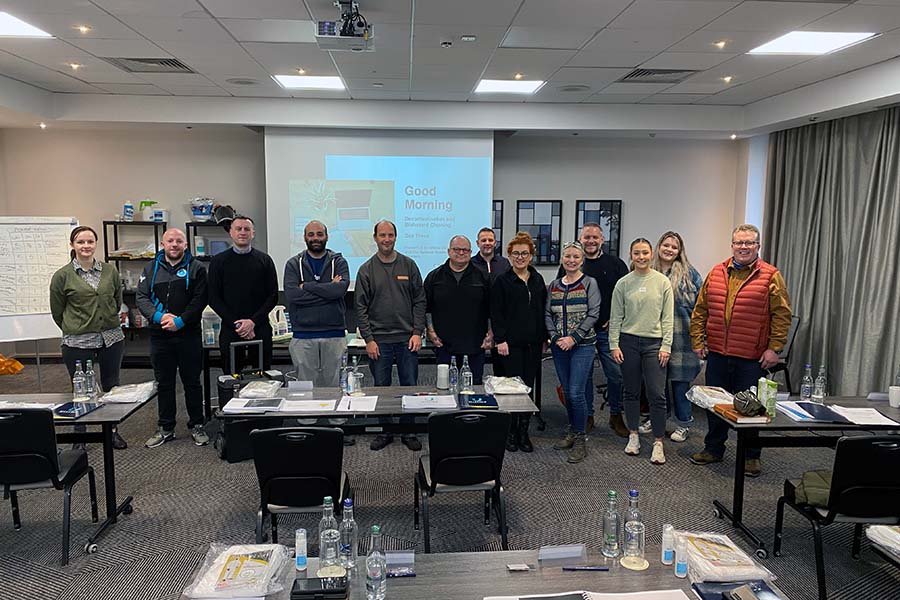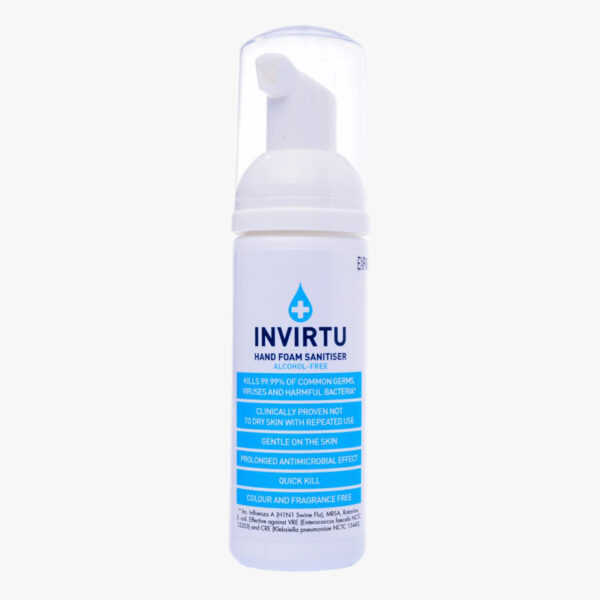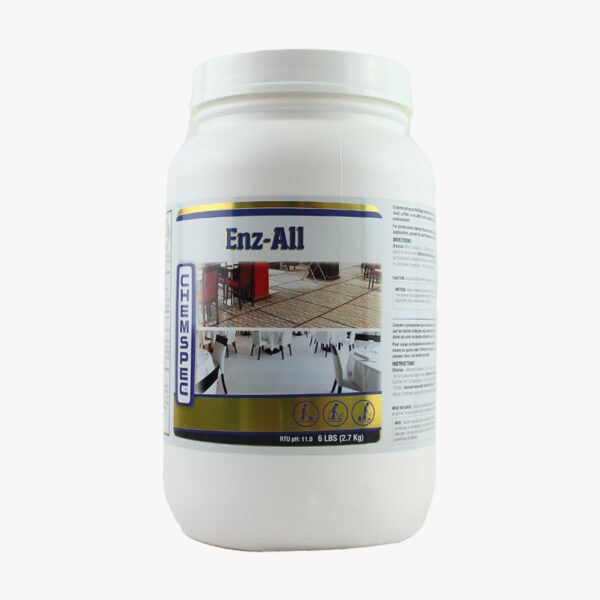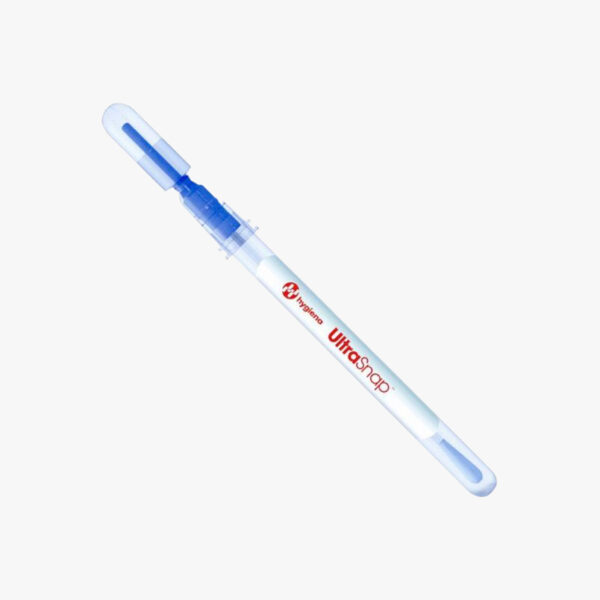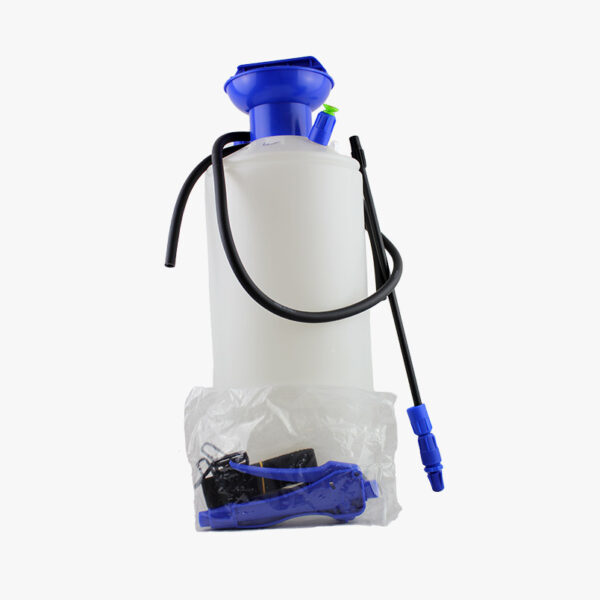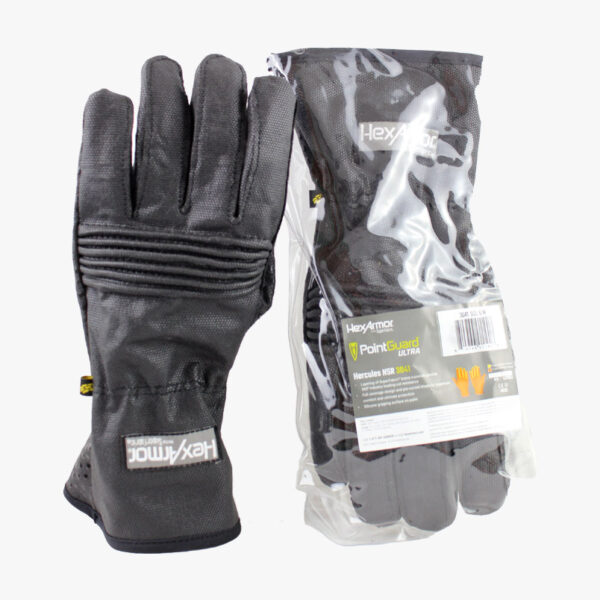Welcome to the dynamic and essential world of the UK’s cleaning industry, a sector characterised by its diversity and its vital role in maintaining public health and safety. Two distinct paths emerge in this industry: regular cleaning and specialist cleaning.
Regular cleaning, the more familiar face of this industry, encompasses the day-to-day cleaning tasks we all know: mopping floors, dusting surfaces, and keeping spaces tidy and hygienic. It’s the kind of cleaning that forms the backbone of our daily lives, from offices and schools to homes and public spaces.
On the other hand, specialist cleaning steps into a different realm, dealing with scenarios that go beyond the routine. A critical part of this is biohazard cleaning, a highly specialised field that handles potentially dangerous biological hazards.
This includes cleaning up after crime scenes, dealing with hazardous materials like blood-borne pathogens, and ensuring environments are safe from infectious diseases.
Biohazard cleaners are trained to manage risks, use specialised equipment, and adhere to strict safety protocols, making their role crucial in situations where standard cleaning methods just don’t cut it.
As we delve deeper into the cleaning industry, let’s explore what it takes to be a specialist cleaner in the UK, particularly in the challenging and highly skilled field of biohazard cleaning.
Qualifications for Regular Cleaners
In the UK, stepping into the role of a regular cleaner doesn’t typically require formal qualifications. So if you’re wondering what qualifications do you need to be a cleaner, officially, the answer is none.
The sector is known for its accessibility, welcoming individuals from various backgrounds without stringent educational demands. This openness is part of what makes the cleaning industry a diverse and inclusive field, providing opportunities for many to build a career.
However, the absence of compulsory formal qualifications doesn’t diminish the value of professional courses in enhancing a cleaner’s skill set. Engaging in professional cleaning courses, like the British Cleaning Certificate Award and the Level 2 Certificate in Cleaning Knowledge and Skills, can significantly elevate the level of service provided. These courses cover a range of topics, from basic cleaning techniques and safety protocols to more advanced and specialised cleaning methods.
By obtaining these certifications, cleaners can not only enhance their cleaning proficiency but also gain a competitive edge in the job market. Employers often view these qualifications as a testament to the cleaner’s commitment to their profession and their capability to deliver high-quality service.
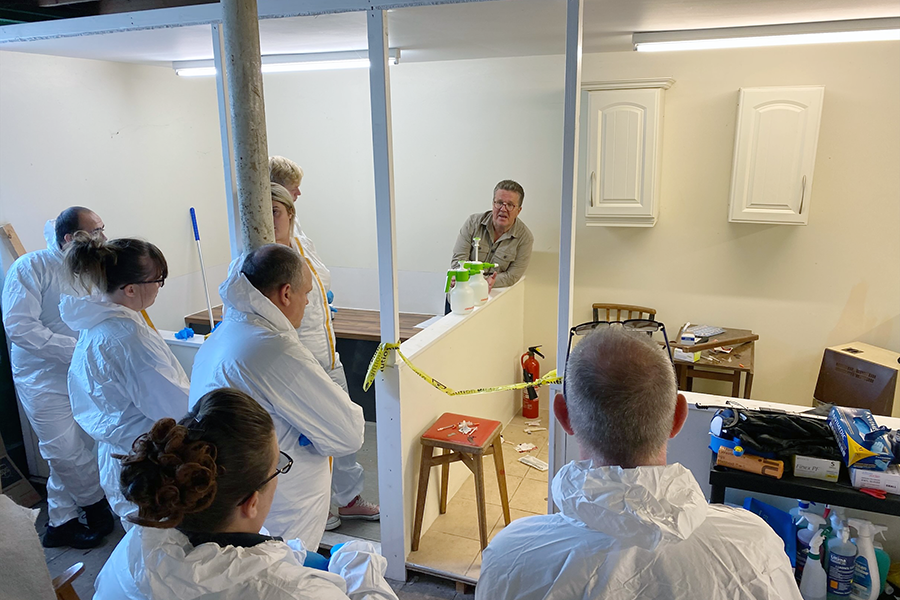
Understanding the Essentials of Biohazard Cleaning
Biohazard cleaning represents a highly specialised and critical sector within the broader cleaning industry. This niche area demands a particular set of skills, knowledge and cleaning experience, as it involves dealing with potentially hazardous and harmful biological substances.
The role of a biohazard cleaner extends beyond traditional cleaning to include the safe handling and disposal of materials such as blood, bodily fluids, and chemical contaminants, often found in crime scenes, medical facilities, and areas exposed to infectious diseases.
The demand for skilled biohazard cleaners has seen a significant rise, particularly in light of global health challenges like the COVID-19 pandemic. This surge underscores the vital role these professionals play in safeguarding public health and ensuring safe, habitable environments in the aftermath of biohazardous incidents.
The sensitivity and potential risks associated with biohazard cleaning make specialised training not just beneficial but essential.
Biohazard Cleaning Qualifications and Training
The training for biohazard cleaning is rigorous and comprehensive. It is designed to prepare cleaners for the array of challenges they might face in these high-risk environments.
Obtaining the right qualifications and training is crucial for those looking to enter this field in cleaning roles. These include:
- Understanding Hazards: Biohazard cleaners must have a deep understanding of the types of hazards they may encounter, including biological agents like viruses and bacteria, as well as chemical and physical hazards.
- Safety Protocols and Procedures: Training programs, such as the online courses offered by Ultima Cleaning Academy, extensively cover safety protocols and procedures. These courses ensure cleaners are well-equipped to safely and effectively handle and dispose of biohazardous materials safely and effectively.
- Cleaning Qualification Courses: The online courses offered by Ultima Cleaning Academy are prime examples of comprehensive curriculum programs. These courses cover everything from the basics of biohazard cleaning to advanced techniques and strategies.
- Practical Skills: Beyond theoretical knowledge, biohazard cleaning requires practical skills in using personal protective equipment (PPE), handling specialised cleaning equipment, and applying effective decontamination techniques.
- Certification: Upon completing these training programs, cleaners receive certifications validating their biohazard cleaning expertise. These certifications are not just pieces of paper; they signify a cleaner’s commitment to maintaining the highest safety and efficiency standards.
Legal Requirements and Age Restrictions for Biohazard Cleaners in the UK
Specific legal and regulatory frameworks govern the role of a biohazard cleaner in the UK to ensure safety and compliance.
Additionally, age restrictions should be considered for those looking to enter this field.
Legal and Licensing Requirements
- Health and Safety Compliance: Biohazard cleaners must adhere to the Health and Safety at Work Act 1974 and the Control of Substances Hazardous to Health (COSHH) Regulations. These laws dictate safe working practices to protect cleaners and the public from potential health risks.
- Waste Carriers License: Handling and transporting hazardous waste requires a Waste Carriers License issued by the Environment Agency. This license ensures that waste is managed responsibly, reducing environmental impact.
- Insurance: Professional indemnity and public liability insurance are essential for biohazard cleaners. These insurance policies provide coverage for potential damages or injuries that could occur during the cleaning process.
Age Restrictions
- Minimum Age Requirement: The minimum age for working as a biohazard cleaner in the UK is typically 18 years. This restriction is due to the nature of the work, which can be physically demanding and emotionally challenging.
- Maturity and Emotional Resilience: Beyond the legal age limit, a certain level of maturity and emotional resilience is expected. Biohazard cleaning often involves dealing with sensitive situations like crime scenes and accidents, which can be distressing.
What is a Level 3 Cleaning Qualification?
A Level 3 Cleaning Qualification is an advanced certification designed for those looking to deepen their expertise in cleaning technology and management.
This qualification is ideal for cleaning professionals who wish to advance their career by gaining specialised skills in cleaning assessment and procedure development.
Here’s what you can expect:
- Risk Assessment and Procedure Development: Learn how to conduct detailed risk assessments and develop effective cleaning procedures to maintain high standards.
- Advanced Cleaning Technologies: Gain knowledge on the latest cleaning supplies, technologies, and methodologies that are crucial for managing complex cleaning tasks across various industries.
- Health and Safety Regulations: Comprehensive understanding of health and safety, including COSHH (Control of Substances Hazardous to Health) regulations, to ensure safe cleaning practices.
- Industry Applications: The course is relevant for professionals across multiple sectors, such as food service, healthcare, and industrial cleaning, where stringent cleanliness standards are required.
- CPD Accreditation: Earning this qualification also provides CPD points, enhancing your professional development and credibility in the field.
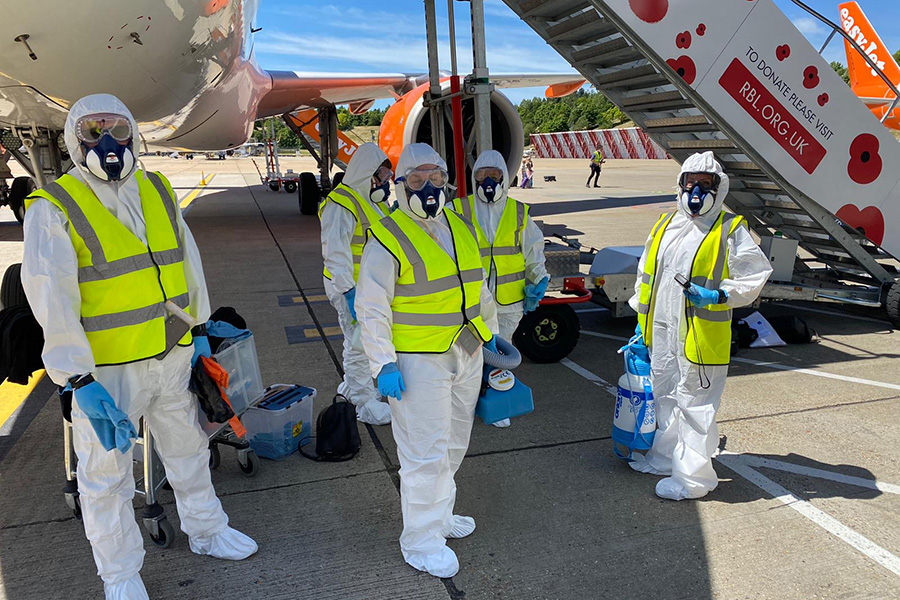
Career Opportunities and Growth in Specialist Cleaning
Specialist cleaners, particularly those in biohazard cleaning, find themselves in a unique and rapidly evolving sector.
With the right qualifications, these professionals can embark on diverse career paths that offer both personal growth and professional advancement.
Career Paths in Specialist Cleaning
- Biohazard Cleaning Technician: Starting as a biohazard cleaner, one can work in various environments, including crime scenes, industrial accidents, and contaminated sites.
- Supervisor/Team Leader: With experience and proven skills, there’s potential to move up to supervisory roles, overseeing cleaning teams and projects.
- Training and Compliance Officer: Experienced cleaners can transition into roles focusing on training new technicians and ensuring compliance with health and safety regulations.
- Business Owner/Entrepreneur: Some may choose to start their own specialist cleaning business, leveraging their expertise to provide unique services.
- Consultant: Seasoned professionals can become consultants, offering their knowledge and experience to guide policies and practices in biohazard cleaning.
New Opportunities and Higher Responsibility Roles
- Advanced Training: Gaining additional qualifications, such as advanced biohazard cleaning certifications or management courses, can position cleaners for roles with greater responsibility.
- Network Expansion: Participating in industry events and engaging with professional bodies can lead to new opportunities and partnerships.
- Specialisation: Specialising in niche areas within biohazard cleaning, like forensic cleaning or infectious disease control, can open doors to unique and high-demand roles.
- Intersectoral Mobility: Skills in biohazard cleaning are transferrable to sectors like healthcare, emergency services, and environmental management, offering broader career prospects.
- Research and Development: For those inclined towards innovation, there are opportunities to develop new cleaning technologies and methods.
Elevate Your Cleaning Career with the Right Qualifications
In the world of cleaning, the journey from a regular cleaner to a biohazard specialist is marked by continuous learning and professional development.
Whether it’s mastering the basics of general cleaning or navigating the complexities of biohazard decontamination, the right qualifications play a pivotal role.
Are you ready to take your cleaning career to the next level? Whether you’re just starting out or looking to specialise in biohazard cleaning, Ultima Academy offers a range of comprehensive and certified courses tailored to your needs.
Don’t let your potential go untapped. Visit Ultima Academy today to discover how our courses can empower your cleaning career.
Your path to becoming a specialist cleaner with sought-after skills starts here!
